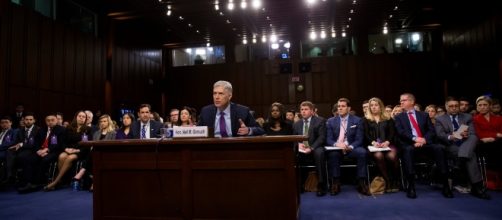Judge Neil Gorsuch proved to everyone on Tuesday what it takes to be on the U.S. Court of Appeals for the Tenth Circuit. His wit, discipline and preparation provided him the effective shields that he needed to endure the notable, cringeworthy attacks he received from all directions. From the democratic critics to the Republicans that tried to protect him from them, here is a look at some of the latest developments that occurred during the judge's confirmation hearings:
The torture question
Democratic Senator Dianne Feinstein brought light to the table when she questioned the federal judge as to why he favored the CIA torturing of terrorism suspects as a legitimate means of intelligence.
During the Bush administration in 2005, harsh interrogation techniques were authorized by top CIA officials that led to death and countless amounts of disturbing confessions. The tables turned during this highlight when Gorsuch replied, "My recollection of twelve years ago is that that was the position that the clients were telling us. I was a lawyer. My job was as an advocate, and we were dealing with detainee litigation. That was my job."
Insight into wiretapping
Senator Patrick Leahy suggested that the current nominee for Chief Justice state his opinion on the president's constitutional rights to lawfully make wiretapping statutes no longer valid. This comes at a time when Donald Trump is accusing the Obama administration of using wiretaps to obtain sensitive information about him.
Judge Gorsuch brought himself and the U.S. Senator to a mutual consensus when he responded, "Presidents make all sorts of arguments about inherent authority-they do-and that is why we have the courts, to decide."
His interaction with the democratic leader after this battle brought him prominent notoriety as President Trump's nomination for the U.S. Supreme Court.
President Trump and the Emoluments Clause
The judge was well reserved in a conversation regarding Donald Trump's businesses and the Emoluments Clause of the U.S. Constitution. The clause states, "no person holding any office of profit or trust" shall "accept of any present, emolument, office or title, of any kind whatever, from any king, prince or foreign state" unless approved by Congress.
This puts a potential halt in the president conducting business with companies affiliated with foreign governments. Suggesting that the clause has, in his own words, "sat in a rather dusty corner," Gorsuch remained neutral to the situation by simply replying, "I have to be very careful about expressing my views."
The Supreme Court continues to bring an abundance to the judicial perspective. One of its top officials has been nominated to answer for the U.S. being circled around controversy. We continue to follow this story as Neil Gorsuch confirmation hearings enter their third day.

